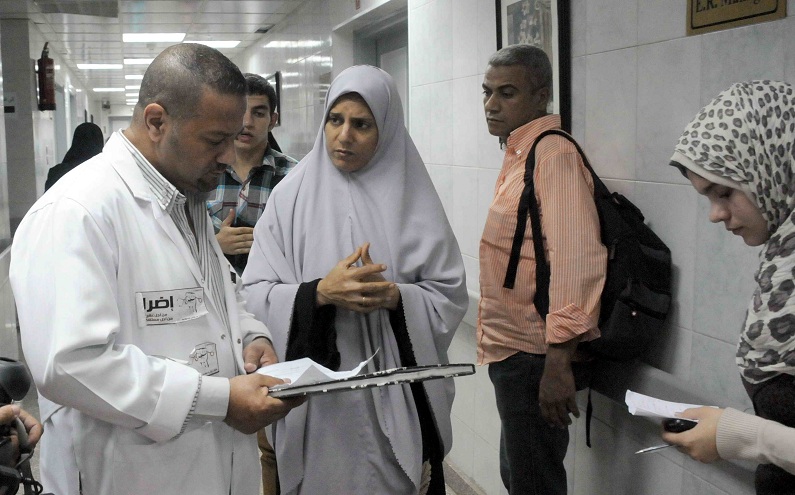CAIRO: Mohamed Bahnasawi is a well-known undertaker (hanouti) in the area between Old Cairo and El Malek El Saleh district. He is a third generation hanouti, a profession that – as unique as it may seem – still faces competition.
Although his business has been operating for 80 years, Bahnasawi admits that earning a living off of this profession is not as easy as it used to be.
“This is a job that should be done as a religious duty. But today we’re facing problems that are threatening our livelihood, he said.
Bahnasawi is referring to “intruders with little knowledge of the profession who are taking on the business as well as some mosque-run charitable organizations that were set up during the last few years and are providing similar services.
Moreover, several companies now offer their employees a hearse and undertaker in the case of the death of a family member.
Also many hospitals – that were once considered the best generators of business – now appoint their own undertakers, said Bahnasawi.
Other undertakers have voiced the same concerns, stressing that such competition has left them in a precarious situation, given that the majority of them are not qualified to earn a living elsewhere.
According to professionals in the business, no licenses for undertakers have been issued since the 1980s. The only ones who currently own licenses are those who have taken the profession on from their families.
Mohamed Atta, a driver at El Warraq Undertaker’s, recalls a time when there were only three or four undertakers operating in the entire capital. “Each of these had no less than 18 or 20 vehicles; then the work seemed endless, he said.
Undertakers also complain that traffic departments countrywide issue licenses for their hearses marked ‘Taht Eltalab’ (upon order) on the plate.
“But this profession is not only about the hanouti’s vehicle and the coffin. The genuine undertaker should be educated and knowledgeable about some particular religious rulings, said Bahnasawi. “But most importantly, he shouldn’t charge people more than what they can afford. Some forget that this is a religious duty and that some of the clients who come to them are families of patients whose long illnesses have taken a toll on their budgets.
A critical issue with many experienced undertakers remains the ‘ghusl’ (ritual washing of the dead’s body). “Some know about the (ghusl) in theory . but there are things that can only be perfected with practice, said Khaled Mostafa, of El Mohandiseen Undertaker’s.
Sources at the charitable subsidiary of El Rahman Mosque in Maadi said that the people they entrusted with the ghusl are experienced and perfectly capable of executing the job.
Charitable organizations run by mosques offer their services at a minimal price as dictated by the Sharia, which, they argue, is the reason behind the undertakers’ complaints.
But undertakers like Bahnasawi see their services as indispensable, arguing that there are cases where their help is “badly needed.
“I remember how undertakers in El Warraq district had to deal with the mass burial of the victims of a major train accident. The macabre scenes of the bodies soaking in pools of blood were extremely difficult to tolerate. Who can work in cases like these other than a honed hanouti? said Atta.
Sources at El Gezira Mosque in Maadi said that undertakers hired by mosques are sometimes tipped about such cases and many of them back out.
“Many of them chicken out and only a genuine hanouti is able to do it. This is the kind of work that requires knowledge and, above all, fortitude acquired with experience, Bahnasawi said.
While Bahnasawi says that washing the deceased’s body could be a routine job when it comes to natural deaths, he insists that some cases can only be handled by authentic hanoutis.
“I remember what happened when a person drowned and was laid into the coffin. As the grave-digger opened the box the body suddenly jumped and every one thought the dead had come back to life.
“Usually a drowned person dies in a squatting position and the body has to be properly straightened. The undertaker who prepared the body for burial must have been ignorant about how to deal with the case. He had simply crammed the body into the box and placed the cover, he explained.
Although mosque imams argue about knowledge of the ghusl, yet most of them agree that if the deceased’s family don’t know a specific hanouti they should refer to neighbors or friends who are well educated about the subject and seek the best qualified person for the job.
“Regardless of the fact of whether he’s a hanouti or a mosque’s mughasel (a person who performs ghusl), they should choose the more experienced one. But it is true that some of the undertakers could certainly be more able to deal with some specific cases than others, said Dr Mohamed Nour, a Sharia scholar.

